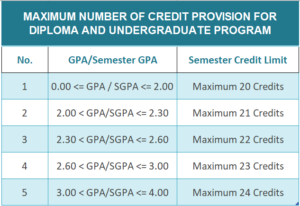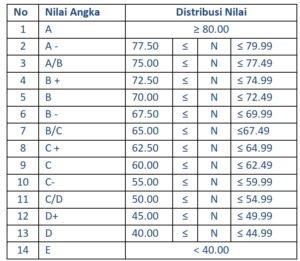Academic Regulation at IP IE UII
Education
Definition of Credit Systems
Universitas Islam Indonesia applies a Semester Credit System (SCS). The application of the Semester Credit System helps students finish their studies faster than the packaged system. In addition, it provides flexibility for students to take majors that meet their interests, talents, and capabilities, and to take different combinations of compulsory and elective courses in one semester. The advantages of the Semester Credit System are as follows:
Students have the flexibility and opportunity to finish their studies faster than other undergraduate programs.
Students are free to choose a major based on their individual interests.
The educational curriculum is adjustable to knowledge and technological developments and hence a ‘link and match educational system’ is made possible. There is no such thing as a class promotion. Programs of semester credits, course composition, and study completion are individually designed.
The academic load of each course is measured by Semester Credit Points (SCPs). The SCPs for each academic activity vary depending on how many hours it takes per week.
A two-credit subject must be formally administered once a week in 100 minutes for a meeting in the classroom
A three-credit subject must be provided twice a week in the class in 150 minutes: 100 minutes for the first session and 50 minutes for another meeting.
A four-credit subject should be given twice a week in 100 minutes for each session.
Academic activities consist of compulsory and optional activities. The compulsory activities have to be attended by all students at a certain level, whereas, optional activities are provided to accommodate the different interests, talents, and skills of students.
The maximum allowable SCPs for students in a certain semester depends on their academic performance represented by GPA (Grade Point Average) in the previous semester.

Up to that maximum, students are free to determine the number of SCPs for each semester and plan the length of study based on their capability.
Students’ Academic Load
An undergraduate degree or Sarjana (S1) degree will be granted to students who have completed all categories of courses. There are five categories of courses, namely Character Development Courses (CDCs), Professional Ethics Courses (PECs), Knowledge and Skill Development Courses (KSDCs), Professional Courses (PCs), and Society Development Courses (SDCs). The detailed descriptions of each category are as follows:
CDCs consist of courses derived from the National Curriculum aimed at equipping students with sound personalities, attitudes, and behavior so that they are well prepared for real social life.
KSDCs embrace courses whose main objective is to lay the foundation for developing skills essential for professional or further academic purposes.
PCs consist of courses mainly intended to equip students with a thorough understanding of analytical tools in a specific area of study.
PECs refer to a group of courses derived from the curriculum of Universitas Islam Indonesia, whose main objective is to build intellectual and moral integrity among students.
SDCs are courses among which students will choose as their area of specialty.
Course and Exam
Courses are held based on a specific schedule. Students might select courses independently during the course registration period (“key-in” period) that generally carried out in the early semester.
Every student must participate in at least 75% of the total meetings of each subject. Later, evaluation is performed 3 times for each semester, as follows:
- Mid Exam
- Final Exam
- Remedial Exam
Important Notes :
- Each type of exam for a subject only conducted once as stated in the official schedule released by Faculty, NO make-up exam allowed in any
- The condition for participating Final Exam is the minimum 75% attendance of total sessions, it also applies for supplementary exam/remedial exam
The GPA Calculation
Students’ GPA is determined by the weight of the subject and the grade of each subject. Later, the grade is stated in the letter format under a certain weight, as illustrated in the table below.

Note : D is considered as FAIL. The C grade becomes the minimum grade to pass the Course. Otherwise, a student must make up the class.
The Calculation of GPA follows the below formula:

Note:
Once a student has resumed entire subjects, the score that indicates the class performance will be called Grade Point Average
The classification for students’ achievement based on GPA is notified by the below remarks:
Graduation Standing
The students’ graduation standings are determined at the end of their academic period. Cumulative GPA (CPGA) at the end of the academic period determines one of the graduation standings. Universitas Islam Indonesia recognizes three different levels of graduation standings, namely:
- CGPA 2.50 – 2,75 is rewarded with Satisfactory
- CGPA 2.76 – 3,00 is rewarded with Very Satisfactory
- CGPA 3.01 – 3.50 is rewarded with Distinction
- CGPA 3.51 – 4.00 is rewarded with Cumlaude
To graduate Cum Laude, students must complete their studies within four years, excluding study leave
Length of Study
The curriculum is designed to be accomplished in 8 (eight) semesters with 144 credits in total. Therefore, a student is classified as pass once he/she has accomplished all subjects stated in the current curriculum with GPA ≥ 2,25.
The normal length of study is 8 semesters or equivalent to 4 years
The maximum length of study is determined as 14 semesters or effective 7 years including formal academic leave.
Academic Leave
Academic leave could be proposed after 1 (one) year or equal 2 (two) semesters of study. Terms and conditions are regulated by Universitas Islam Indonesia.
Drop Out
A student is considered as DO, if:
- No credit is accomplished during the first 2 semesters. Hence, it is concluded that the student has no intention to study at the International Program, Department of Industrial Engineering
- In the first 4 semesters, credits accomplished < 30 credits with GPA < 2,25, therefore, the student is concluded to be suspended (withdrawn) from the program
- Performs the unregistered academic leave for 4 semesters consecutively (automatic DO and the action is considered as self-resignation).
Teaching and Learning Process Regulations
Regulations for Students (Offline Meeting)
Students Regulation for offline classes :
- A student should dress properly. T-shirts, sandals, and earrings for a male are not permitted. The dress code requirements are as follows:
- MALE students: neat trousers (torn or ripped trousers are unacceptable), a neat shirt or polo shirt (t-shirts or ripped shirts are unacceptable), shoes
- FEMALE students: hijab (Moslem/Syarie outfit), shoes
- It is highly expected for students to be on time for class. If a student comes more than 15 minutes late, s/he is considered absent from the class, despite the fact that s/he may join the lecture.
- use online gateway attendance information systems to record student attendances (https://gateway.uii.ac.id)
- Students should pay special attention to the importance of a face-to-face meeting so that they can reach 75% of class attendance. Failure to fulfill the obligation leads them not to be permitted to join the examination.
- An academic sanction will be given to those who violate academic regulations.
- For practicum classes for Industrial Engineering students, it should be noticed that the practicum consists of an independent practicum and laboratory projects. It is not allowed for the students to leave the class during the practicum.
- Students should not leave the class for unreasonable causes. Leaving the class will be considered an absence for the whole meeting.
- Students and a lecturer have a structured meeting in 50 minutes.
- Students are required to carry out a structured assignment for 60 minutes.
- Students should arrange regular independent activities in 60 minutes.
Regulations of Lecturing Program
In running offline classes, lecturers:
- must attend 100% of scheduled classes.
- must arrive and dismiss the class on time as scheduled.
- must dress properly. The dress code requirements are as follows:
- akhwat (female): hijab (busana muslimah)
- ikhwan (male): formal attire – long trousers, shirt, and tie
- use online gateway attendance information systems to record student attendances (https://gateway.uii.ac.id)
- must not tolerate students who are more than 15 minutes late.
- must not tolerate students who do not wear the required dress.
- may dismiss the class if no student comes within 15 minutes and vice versa.
- are considered teaching one meeting if the dismissal is caused by the students’ absence and do not need to hold an extra meeting to substitute it.
- are required to hold an extra meeting to substitute the dismissal if it is caused by the lecturer’s absence.
- are required to have a face-to-face meeting with students at least 75% of the required total meetings based on the subject’s credit points.
- must hold the class with the time allocation based on the subject’s credit point. Per credit, the point is equivalent to 50 minutes of the meeting.
- should apply a “student centered” (active learning) method when teaching and are recommended to use case studies as a part of independent assignments.
- Determine the assessment components and the percentage of each component (if the students achieve their minimum 75% attendance). For students that cannot achieve their 75% attendance, the lecturers are free to give them the maximum grade of C.
- should at least use PowerPoint when teaching. Computers and Smartboard are provided. Please, contact IP management for any troubles caused by this equipment.
- are strongly required to hold a substitution class. Please, set the timetable with the students and let the IP management know of scheduled arrangements to make sure that there is no scheduling conflict.
- should apply the examination form (for Industrial Engineering lecturers): oral and written. It is also kindly suggested to combine the classical method and case study presentation when holding the mid and final examination. For courses that are not possible to apply the case study presentation, classical method examinations will be held as scheduled.
Course Enrollment
Before a semester starts, each student must pay the tuition fees and enroll in courses of interest (key-in). The enrollment process includes the selection of courses and the registration for these courses through a key-in on the computer system (RAS Information Systems). IP management appoints academic advisors to guide students in selecting appropriate courses taken for the semester. The time schedule for key-in is based on the academic calendar issued by the university. If students cannot do the key-in at the scheduled time, they are allowed to ask for assistance from a fellow student to complete the key-in. A failure to meet the due date will result in a study leave (see regulation for study leave). The enrollment procedures for freshmen students are slightly different from those for students of other semesters. The details of each are as follows:
Enrollment Procedure for Freshman Students
To enroll in one program, the freshman students must have completed registration and show valid student ID cards.
Comply with the enrollment time schedule.
Take a package of courses selected by the International Program for the first year only as shown below.
Take the responsibility for any mistake during the key-in process that results in failure to participate in the package courses. The management will record these courses through key-in on the computer.
Re-enrollment Procedure
The procedures of re-enrollment are that the students:
- have paid all tuition fees and completed the registration before the due date.
- show valid student ID cards.
- show the letter from the library stating that they do not have any outstanding loan book(s).
- comply with the enrollment time schedule.
- select courses according to the study path, the number of which depends on the GPA in the previous semester (see the study path).
- register these courses through the key-in on the computer according to the schedule (course registration beyond the schedule is penalized by 3 credits reduction).
- revise the registration of courses (if necessary) during revision time scheduled. After the revision time schedule, it is not permitted to change courses that have been chosen.
Re-enrollment for Students Currently on Study Leave
To enroll in the programs, students currently on study leave must:
- show a permission letter of being a re-active student issued by the Rector.
- provide a copy of their last academic transcript.
- have paid all tuition fees and completed the registration to be active students.
- select courses according to the study path, the number of which depends on the GPA of the last semester taken before the leave.
- consult his/her academic supervisor about his/her re-enrollment and the load to be taken.
- revise the registration (if necessary) during the revision time schedule. After the revision time schedule, it is not permitted to change courses that have been chosen.
Procedures for Determining Maximum Credits that Can be Taken in One Semester
The number of credits undertaken is based on semester GPA n-1 and cumulative GPA n-1 by using the formula of the gateway as academic information systems (RAS) for course enrollment. so that students can automatically see the maximum credits they can take in a given semester.
The minimum credit undertaken in a given semester is 12, and the maximum is 24.
Non-credit courses are not considered as credit load, but it is compulsory for students to register in the courses through the key-in.
The number of credits for re-enrolled students after their study leave is based on their last semester GPA and cumulative GPA before they take the leave. In any case, it is recommended that re-enrolled students consult their academic supervisors prior to deciding the number of credits to take.
Coursework Completion (Tutup Teori)
Students of Industrial Engineering can propose a coursework completion by following the procedures below.
- Fill out the coursework completion application form. Click this link: http://bit.ly/courseworkcompletionIP
- Registered as an active student based on term and academic year stated in the form
- Have paid the Catur Dharma fee
- Passed all subjects prevailed in International Program, Industrial Engineering Department, with the minimum GPA of 2.50
- Passed all subjects classified as university subjects (State philosophy, Civil Education, Religion Education, Ibadah & Akhlaq, Islamic Civilization, Islamic Leadership, Entrepreneurship, English) with a minimum grade of C
- Comprise no D grade
- Accomplished all laboratory works with a minimum grade of C






